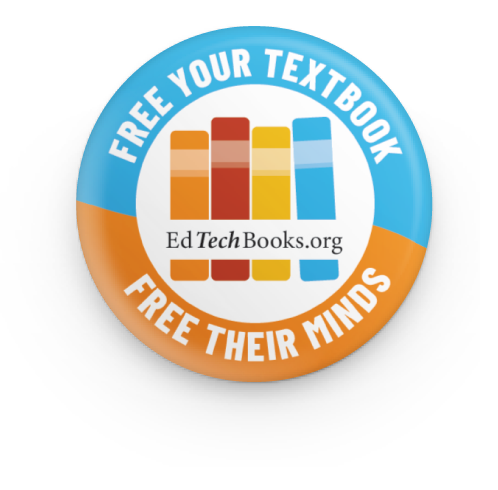We do not have a scarcity of resources in the world. ... What we have is a scarcity of collective moral conscience.
The only legitimate role for new media and technology in education is to increase our capacity to be generous with one another. The more open we are, the better education will be.
We have created this site and provided all of our content freely, because knowledge should be free, and educational technology should lead the way!

Our goal is nothing less than providing the best open textbook publishing platform and author experience on the web!
We have four guiding values for this initiative:
The impacts of a resource like this are multi-faceted and difficult to quantify, because it can improve learning, foster sharing, increase collegiality, and provide a variety of other social benefits. For a current estimate of our quantifiable cost savings to students, however, please visit our impact page.
We only include content on this site that is gratis (free as in no cost), but not all content may provide freedoms to users for remixing, etc. (free as in freedom). Each book included in this site is released under its own license, and some include chapters or other content that may be released under yet another license. If you have questions about reuse, remixing, etc., please consult the copyright notice on the individual work.
Books that are hosted on other sites (e.g., PressBooks) that we link to may have their own licensing requirements.
To learn more about licensing and copyright, check out this introductory chapter on the topic.
This webinar hosted by the AECT Research and Theory Division provides an overview of some of the projects occurring through EdTech Books.

Current and emerging research on faculty perceptions and barriers to open textbook adoption reveals that almost all faculty believe that open textbooks are a good idea, but few actually use them. The reasons for this are three-fold:
These barriers are real and prevent most faculty from moving in the direction of open textbooks. But, it is precisely to address these barriers that we created this platform! (For more information on overcoming barriers, see Irvine et al., 2021.)
Some educators believe that the textbook, like print media, is effectively dead or that it perpetuates poor pedagogical practices. We sympathize with these attitudes but also recognize a few realities.
First, most courses in the U.S. still rely upon a textbook (69% according to Seaman & Seaman, 2018). Second, much of the lack of adoption of open educational resources (OER) can be attributed to their lack of perceived quality and difficulty in finding them. And third, packaging OER into a usable, flexible textbook format makes these resources more appealing and accessible to diverse educators who exhibit a wide array of technical skills and motivations to use OER. In short, open textbooks provide a simple, first step into the world of OER, and though some may criticize open textbooks as not being radical enough, it is precisely their combination of the old and familiar with the new and radical that makes them a trialable, compatible, and relatively advantageous innovation (cf., Rogers, Diffusion of Innovations, 2003) that practically any educator can readily adopt.
Most of the people reading our content are finding it through search engines, but by tracking how readers get to our site, we can also see that our books are increasingly being used by universities and other organizations all over the world. Some notable entities that utilize our content in their courses include the following:
Nope. It's all free. Forever. We're just educators who care about our students and also want to make life easier for other educators.
Though we may eventually need to operate on donations or to charge for some add-on services, our core goals, values, and commitments will not change. In particular, we plan to never charge readers or authors to access or create open educational resources, and we will remain ad-free forever.
For security reasons, we have elected not to collect more information from users than is necessary, meaning that we never store passwords or other sensitive information if we can help it. Instead, we rely upon third parties to authenticate our users and only store a user ID provided by the third party. Currently, Google and ORCID are the main providers, but we hope to add others in the future.
Note that by using an external service to login we also are not collecting information from that service or allowing them to gain access to your content on our site. So, if you login with Google, we won't have access to your Google documents, and Google won't have access to your EdTech Books chapters. Rather, we are only using the login mechanism itself and not other data or resources that the third party might provide.
This is a temporary measure as we scale up. We're happy to increase your limit. Just email us.

We have worked hard to design and continually improve this site to be the best open textbook platform on the web. Some features include the following:
For more information about features, please visit the complete feature list. Or to see a list of recent updates, visit the updates log.
By hosting or linking to content on this site, we do not claim ownership of the content, and we or our partners should not be viewed as supporting the veracity or opinions of content authors. All specific content items merely reflect the opinions of their authors.

Want to get your book published and reach a wider audience? Want to do research on user experiences with your book? Please review our Publishing with Us page, and we'd love to chat with you about hosting your book for free.
It's been fabulous working with this platform — so much easier and more well-designed than the other OER platforms out there.

Do you have a great, free textbook that you would like to see included in our list? Submit a link to your book, and we will attempt to include it.
If you would like to contribute to an existing project by writing or editing a chapter, please contact the book author(s) directly.
For a list of projects that are currently soliciting contributions, please visit the current projects page.

This site is developed and maintained by Dr. Royce Kimmons at Brigham Young University.
If you have questions or requests, please direct them to the website administrator at admin@edtechbooks.org.
Many users want to know additional details about the technology underlying our platform. This system was created by Dr. Royce Kimmons. It is scripted in PHP and Javascript (jQuery) and has a MySQL back end. The front end is developed using the Bootstrap library. Hosting servers utilize Linux (Ubuntu) and are hosted by Amazon (AWS). PDF generation utilizes the mPDF library.